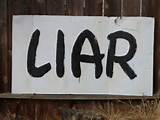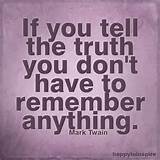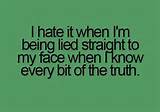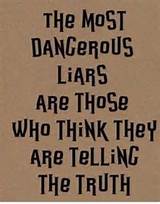Why Do We Dislike Liars?







Liar Liar!
Everybody lies sometimes. Most feel little white lies are not a big deal. However, those who continually lie and seems to compelled to do so about both minor and large things has a serious problem.
Those in this classification are referred to as pathological liars. They lie to make themselves, look good or for personal gain. Sometimes to avoid consequences for something they know they did wrong. It often gets worse over time.
Truth is a standard based on an absolute solid foundation. Honesty reflects our inner character and faith, and helps us keep a clear conscience. It's also a trait many employers seek in their hiring practices.
What is truth?
Most everybody wants to know the same thing. Why do we expect less honesty from politicians than from ordinary folks? Why do we dislike liars? It’s a matter of trust. When a person lies it makes it difficult to believe anything else that individual ever says again. Some are so good it often takes a while to find out we have been lied to.
How can we know when we are being lied to? There is no guaranteed method, but there are frequent clues you can see that should make you suspicious, Here a few:
-
Changes in voice. A variation in voice or rate of speech.
-
Body language. Nervous fidgeting can indicate deception. When lying the person usually puts themselves in a state of stress. Adrenaline increases and the body tends to tense up.
-
Contradicting statements. Making statements crontradicting something they said earlier should raise a red flag. The normal speaking voice becomes slower. Their speech may also become slurred or they might even stutter.
-
Covering the mouth. Studies have shown children have a tendency to cover their mouths when they lie. Many adults do the same.
-
Hiding Hands. If a person abruptly hides their hands it might very well be a signal that person may be telling an untruth. Another signal is continually keeping eye contact. Actually the liar wants to look away, but reasons if they do they will be caught in a lie.
-
Rubbing or clenching fists. Rubbing hands or clenching of fists may indicate a person is experiencing stress. If a person is experiencing stress during a normal conversation it might indicate a person is lying.
So How Big a Problem is it?
Studies have shown most of us are terrible at spotting a liar. Lying is widespread. Studies have shown most people tell about two lies every day.
The Difference Between Being Misled and Lied to
Someone may mislead you truly believing what they said. Most of us have promised something we really meant, only to find later we couldn't deliver. The person on the receiving end may feel like they have been lied to.
How Can We Know?
But how can you know when a person is lying? Give them a chance to give themselves away by letting them talk. Find out how willing they are to talk about things about which you think they may be lying.
Research has revealed liars will tend to use fewer words when talking about something they are lying about. If they are lying, the more information they reveal, the more likely they are to contradict themselves. If someone willingly tells you everything about something but suddenly becomes less talkative or keeps repeating small bits of information, they might very well be trying to cover their tracks.
Most of us forget stuff like a name, or the time something happened.This is normal. Many can't recall small bits of information. However, the more honest you are, the more likely you are to admit you just can't remember. Liars, on the other hand, can seemingly immediately develop photograpic memory or recall unimportant details. Ask yourself “Do they seem anxious to change the subject?” A liar can lie as much by what they don't tell you also. Omitting information is still a lie.
’.



